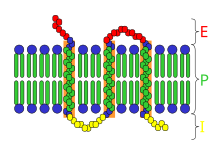
Back بروتين غشائي مدمج Arabic অবিচ্ছেদ্য আবরণী প্রোটিন Bengali/Bangla Integralni membranski protein BS Proteïna integral de membrana Catalan Integrale Membranproteine German Proteína integral de membrana Spanish Integraalsed membraanivalgud Estonian Mintzeko proteina integral Basque پروتئینهای غشای سراسری Persian Integraalinen kalvoproteiini Finnish

An integral, or intrinsic, membrane protein (IMP) [1] is a type of membrane protein that is permanently attached to the biological membrane. All transmembrane proteins can be classified as IMPs, but not all IMPs are transmembrane proteins.[2] IMPs comprise a significant fraction of the proteins encoded in an organism's genome.[3] Proteins that cross the membrane are surrounded by annular lipids, which are defined as lipids that are in direct contact with a membrane protein. Such proteins can only be separated from the membranes by using detergents, nonpolar solvents, or sometimes denaturing agents.
Proteins that adhere only temporarily to cellular membranes are known as peripheral membrane proteins. These proteins can either associate with integral membrane proteins, or independently insert in the lipid bilayer in several ways.
- ^ "intrinsic protein | biology". Britannica. Retrieved 2022-07-04.
- ^ Steven R. Goodman (2008). Medical cell biology. Academic Press. pp. 37–. ISBN 978-0-12-370458-0. Retrieved 24 November 2010.
- ^ Wallin E, von Heijne G (1998). "Genome-wide analysis of integral membrane proteins from eubacterial, archaean, and eukaryotic organisms". Protein Science. 7 (4): 1029–38. doi:10.1002/pro.5560070420. PMC 2143985. PMID 9568909.
© MMXXIII Rich X Search. We shall prevail. All rights reserved. Rich X Search